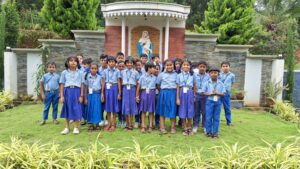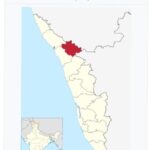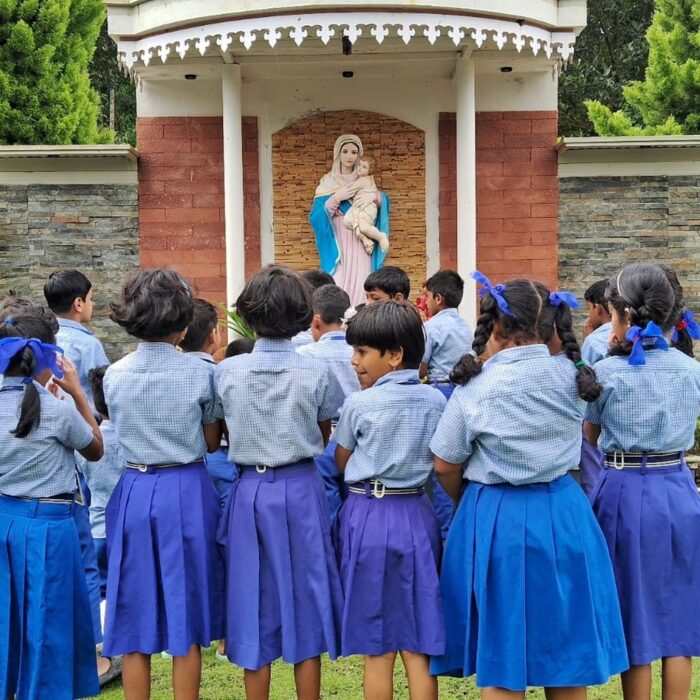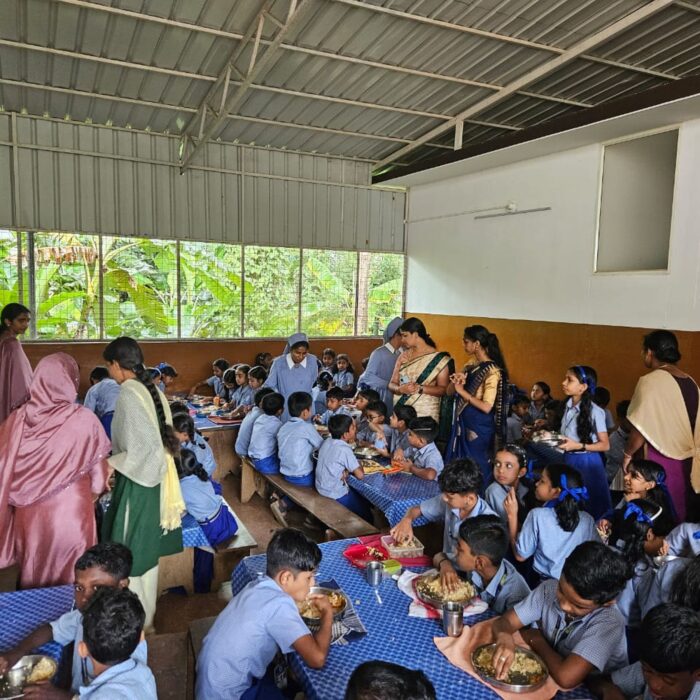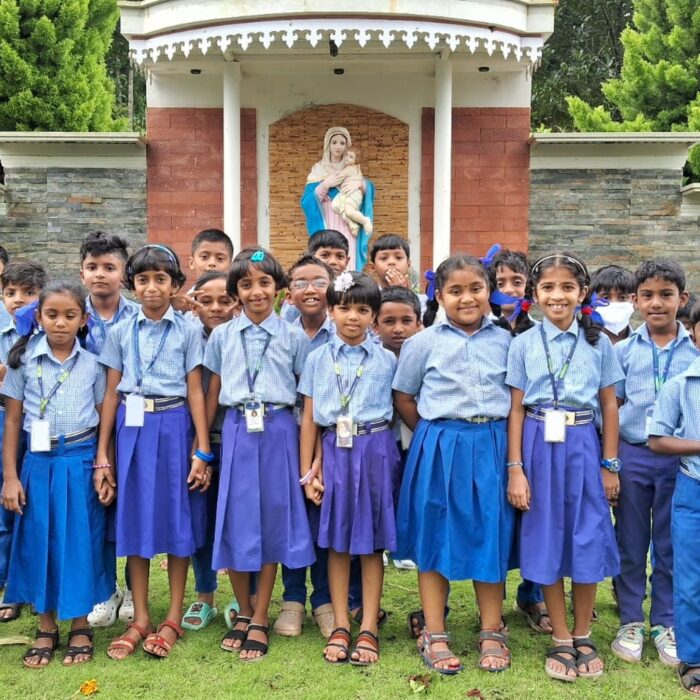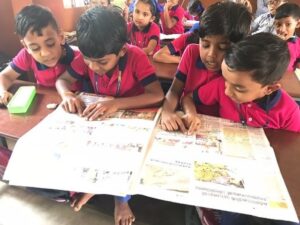Developing firm and free personalities
We are delighted that our community in India is growing and that young sisters from India are taking on responsible tasks. They work with children, young people, and adults at various locations in educational, social, and pastoral projects and facilities. Thanks to many donations, it is possible to help numerous children with their education, upbringing and development.
Sister M. Angeline Muthirakalayil is a teacher at one of our schools in India. She reports on the structure and life at our school.
Developing firm and free personalities
has been a primary goal of the Schoenstatt Movement since its beginning. Today I would like to talk specifically about our approach to education in our school in Wayanad, a district in northern Kerala, India. The district has a hilly landscape known for its beauty, its forests, and for the many tribal communities that live there. Most people are involved in agriculture. Because there are still wild animals in the forests, people are repeatedly the victims of attacks by these animals, e.g. wild elephants and tigers, and often the cultivated fields are also destroyed by wild animals.
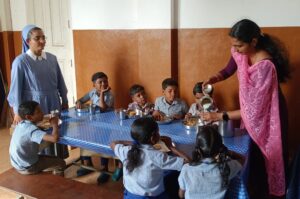
We took over the management of an existing, poor school in a small village called Moolithode in this area 26 years ago. Thanks to your help, we did much renovation, refurnished classrooms, set up a kindergarten, and purchased good teaching materials. We currently look after and teach around 275 children ages 3 to 11. Several sisters have received the proper education and training to ensure good teaching. Children of different religions such as Hindus, Muslims and Christians, as well as the children of the indigenous people, learn together.
The children who come to our school from the tribal communities belong to the “Paniya group” and live on the margins of society. The parents of these children are illiterate. Both father and mother are often alcoholics and suicidal. In addition, they do not know how to provide for the future. They spend everything they earn on the same day, and if they have no work, they go hungry. They are also often cheated out of their wages by the people who employ them.
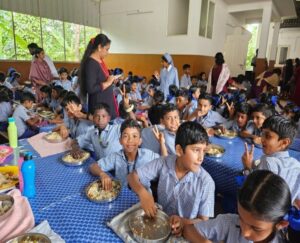
Education plays a very important role in improving the living conditions of these poor people. The children are usually very introverted and reluctant to go to school; their parents do not encourage or support them in this step. The best way to “attract” these children is to give them a home at school and provide them with breakfast and lunch (paid for by the government), to give them the opportunity to come to school by car, to give them good clothes and books books, and all the things they need to study.
In addition to this brief explanation about the situation of families, I would like to show also that our focus is on the holistic development of the children in our school.
The motto of our school is:
“We want to form free and firm personalities …”
Diese Zielsetzung wurde von unserem Gründer, Pater Josef Kentenich, schon im Jahr 1912 als Konzept genannt und ist auch heute in unserer Situation sehr zutreffend.
As Schoenstatt Sisters of Mary, as Sisters of the Blessed Mother, the Mother Thrice Admirable of Schoenstatt, we ask that she take care of the children who come to our school and their families! That is why we placed a statue of Our Lady opposite the entrance where the children come onto our premises. The Blessed Virgin Mary welcomes all the children and their parents. It is very beautiful to see with how much love and devotion the children and their parent–from all religions–greet Mary with flowers that they bring for her from their homes.
The father of the nation of India, Mahatma Gandhi, said, “By education I mean the all-round development of the best in the child and in the person–body, mind and soul.” This is reflected in our motto:
Forming a free and firm personality.
As in any other school, we provide the children with qualified instruction and at the same time create places where they can develop their creativity and learn to practice social values.
These are some of our projects in Wayanad:
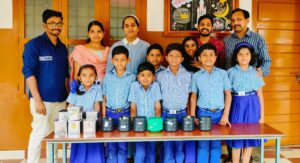 1. I bring, what I can …
1. I bring, what I can …
Every Wednesday every child in our school brings a small monetary donation (at least one rupee) and puts it in a box which is kept in the classroom. In June, when the school year begins, we inform the parents about this and on Tuesdays we remind the students. After a few months, in the presence of the students, the teacher opens the box and counts the money. With this money we help poor people; for example by purchasing and giving away chickens, buying medicines for destitute cancer patients or sick people, buying good clothes for the students who have no good clothing and so on …
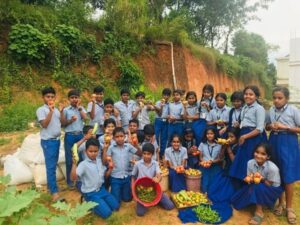 2. Living with nature – planting a vegetable garden
2. Living with nature – planting a vegetable garden
India is an agricultural country and the people are connected to nature. But due to the development of social media and after the corona virus pandemic, the younger generation often has an aversion to the earth and agriculture and spends more time in front of the computer, TV, or smartphone. We see a tendency among the children to always be alone or to have inhibitions about being with others. To motivate them for various group activities and to involve them in nature, our school provides them with vegetable seeds or seedlings.
With the help of their parents and siblings, they plant the seeds or seedlings near their houses and take care of the vegetable plants. They also keep a journal in which they record their observations about the growth of the plants and what they have done–together at home–to ensure the healthy development of these seedlings. In the meantime, the teachers visit these vegetable gardens and award prizes to the students who have the best vegetable garden. We also have a vegetable garden at our school, which is tended by the teachers and children in their free time. These vegetables are used for the afternoon meals that we prepare for all the children at the school.
3. A newspaper in every class …
With the advent of smartphones and other social media, the children’s willingness to read has declined alarmingly. Our school is an elementary school up to the fifth grade, where children learn the basics of reading and writing. In first and second grade they learn the alphabet, and in third to fifth grade they are able to read and understand the contents of newspapers. To give them an insight into the various topics and daily happenings in society and the world, we provide for each class a newspaper in our regional language Malayalam.
To test their comprehension and memory, we organize a competion each weak that consists of a quiz based on information from the newspapers of the previous week. Then we give prizes to the winners. This encourages the children to read newspapers, makes them competitive, and helps them increase their general knowledge.
Sister M. Angeline Muthirakalayil
If you would like to support this project, the sisters would be grateful.
Contact address in Germany: Mission Center of the Schoenstatt Sisters of Mary
Attention: Sister M. Liane Kipper, Berg Schönstatt 6, 56179 Vallendar, Germany
Telephone: 0261 6404-315. E-Mail: missionszentrale@s-ms.org
Homepage: www.missionszentrale-s-ms.org und www.schoenstaetter-marienschwestern.org
Bank account details: Missionszentrale Vallendar, Liga Bank eG. IBAN DE10 7509 0300 0000 0589 20
BIC GENODEF1M05
Attention: Sister M. Liane Kipper, Berg Schönstatt 6, 56179 Vallendar, Germany
Telephone: 0261 6404-315. E-Mail: missionszentrale@s-ms.org
Homepage: www.missionszentrale-s-ms.org und www.schoenstaetter-marienschwestern.org
Bank account details: Missionszentrale Vallendar, Liga Bank eG. IBAN DE10 7509 0300 0000 0589 20
BIC GENODEF1M05
